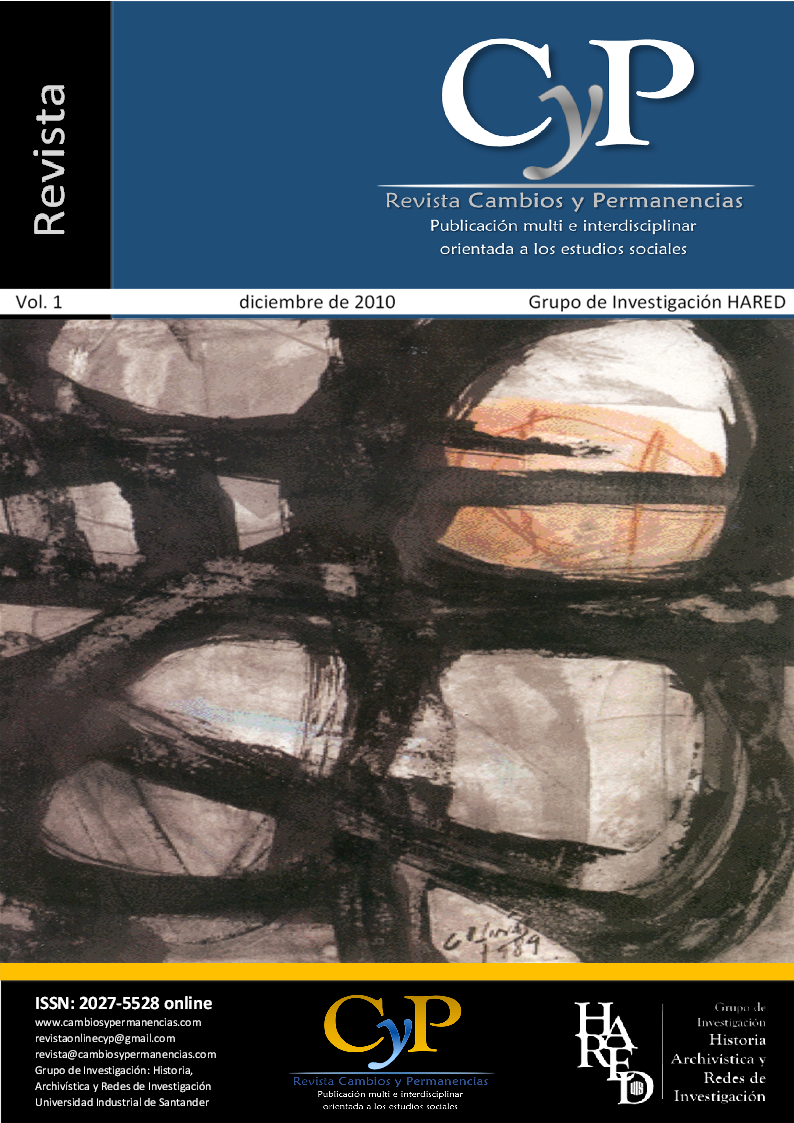Artículos
CONFIGURATION SPACE, LAND AND CULTURE IN THE REGION OF COLOMBIA VENEZUELA BOUNDARY. Theoretical assumptions, guidelines and limitations
Keywords
- Territory,
- region,
- space,
- pre-Hispanic settlement,
- archaeological
- ethno historical ...More
How to Cite
Moreno González, L. (2010). CONFIGURATION SPACE, LAND AND CULTURE IN THE REGION OF COLOMBIA VENEZUELA BOUNDARY. Theoretical assumptions, guidelines and limitations. Cambios Y Permanencias, (1), 209–237. Retrieved from https://revistas.uis.edu.co/index.php/revistacyp/article/view/7562
Abstract
This article uses a critical review to explore theoretical guidelines to propose a representation of a historical and cultural area between the North-eastern border of Colombia and the states of Tachira and Merida of the Republic of Venezuela. This representation aims to understand and compare historical and cultural dynamics of pre-Hispanic settlements. Thus, this bordering region is presented as a living territory with constant variations across over time and space, which forms a complex network of trade and people without national borders. The Lake of Maracaibo is the focus of this interdisciplinary research that combines archaeological, ethno historical and economical sources to approach a more complete view of the past.
Downloads
Download data is not yet available.
References
Boisier, S. (1993). Desarrollo regional endógeno en Chile: ¿utopía o necesidad? Ambiente y desarrollo. En CIPMA. (Ed.), Chile, ¿la hora de las regiones? Valparaíso.
Boisier, S. (1997). El vuelo de una cometa. Una metáfora para una teoría del desarrollo territorial. Revista Eure, (69).
Braudel, F. (1992). El Mediterráneo; el espacio y la historia. México: Fondo De Cultura Económica.
Echeverría, M. C. (1997). Hábitat, ambiente y educación: fronteras hacia el futuro. Medellín: Universidad Nacional de Colombia.
Echeverría, M. C. (2001). Descentrar la mirada: avizorando la ciudad como territorialidad. En Red de Espacio y Territorio. (Ed.), Espacio y territorios: razón, pasión e imaginarios (pp. 217-249). Santafé de Bogotá: Universidad Nacional de Colombia.
Haggett, M. (1988). Geografía, una síntesis moderna. Barcelona: Omega.
Harvey, D. (Ed.). (2000). El nuevo urbanismo y la trampa comunitaria. En La vanguardia, Barcelona.
Herrera Ángel, M. (2005). Historia y geografía, tiempo y espacio. Historia Crítica, (27).
Krugman, P. (Ed.). (1990). Increasing returns and the theory of international trade. En Rethinking International Trade. Inglaterra: MIT Press.
Lefevre, H. (1994). the production of space. Barcelona: Península.
Massey-Doreen, A. (1994). Global sense of place – by from space, place and gender. Minneapolis. Minneapolis, USA: University of Minnesota Press.
Oslender, U. (1999). Espacializando resistencia: perspectivas de espacio y lugar. Cuadernos De Geografía, 8(1), 2-6.
Routledge, P. (2004). Convergence of commons: process geographies of people’s global action. The Commoner, 8.
Rozo-Gauta, J. (.Ed.). (1997). Espacio y tiempo entre los Muiscas. En Colombia. Bogotá: El Búho.
Téllez Sánchez, R. (2002). Metamorfosis espacial y ficciones territoriales en la construcción de la región nororiental. Bucaramanga: Compromiso.
Boisier, S. (1997). El vuelo de una cometa. Una metáfora para una teoría del desarrollo territorial. Revista Eure, (69).
Braudel, F. (1992). El Mediterráneo; el espacio y la historia. México: Fondo De Cultura Económica.
Echeverría, M. C. (1997). Hábitat, ambiente y educación: fronteras hacia el futuro. Medellín: Universidad Nacional de Colombia.
Echeverría, M. C. (2001). Descentrar la mirada: avizorando la ciudad como territorialidad. En Red de Espacio y Territorio. (Ed.), Espacio y territorios: razón, pasión e imaginarios (pp. 217-249). Santafé de Bogotá: Universidad Nacional de Colombia.
Haggett, M. (1988). Geografía, una síntesis moderna. Barcelona: Omega.
Harvey, D. (Ed.). (2000). El nuevo urbanismo y la trampa comunitaria. En La vanguardia, Barcelona.
Herrera Ángel, M. (2005). Historia y geografía, tiempo y espacio. Historia Crítica, (27).
Krugman, P. (Ed.). (1990). Increasing returns and the theory of international trade. En Rethinking International Trade. Inglaterra: MIT Press.
Lefevre, H. (1994). the production of space. Barcelona: Península.
Massey-Doreen, A. (1994). Global sense of place – by from space, place and gender. Minneapolis. Minneapolis, USA: University of Minnesota Press.
Oslender, U. (1999). Espacializando resistencia: perspectivas de espacio y lugar. Cuadernos De Geografía, 8(1), 2-6.
Routledge, P. (2004). Convergence of commons: process geographies of people’s global action. The Commoner, 8.
Rozo-Gauta, J. (.Ed.). (1997). Espacio y tiempo entre los Muiscas. En Colombia. Bogotá: El Búho.
Téllez Sánchez, R. (2002). Metamorfosis espacial y ficciones territoriales en la construcción de la región nororiental. Bucaramanga: Compromiso.

